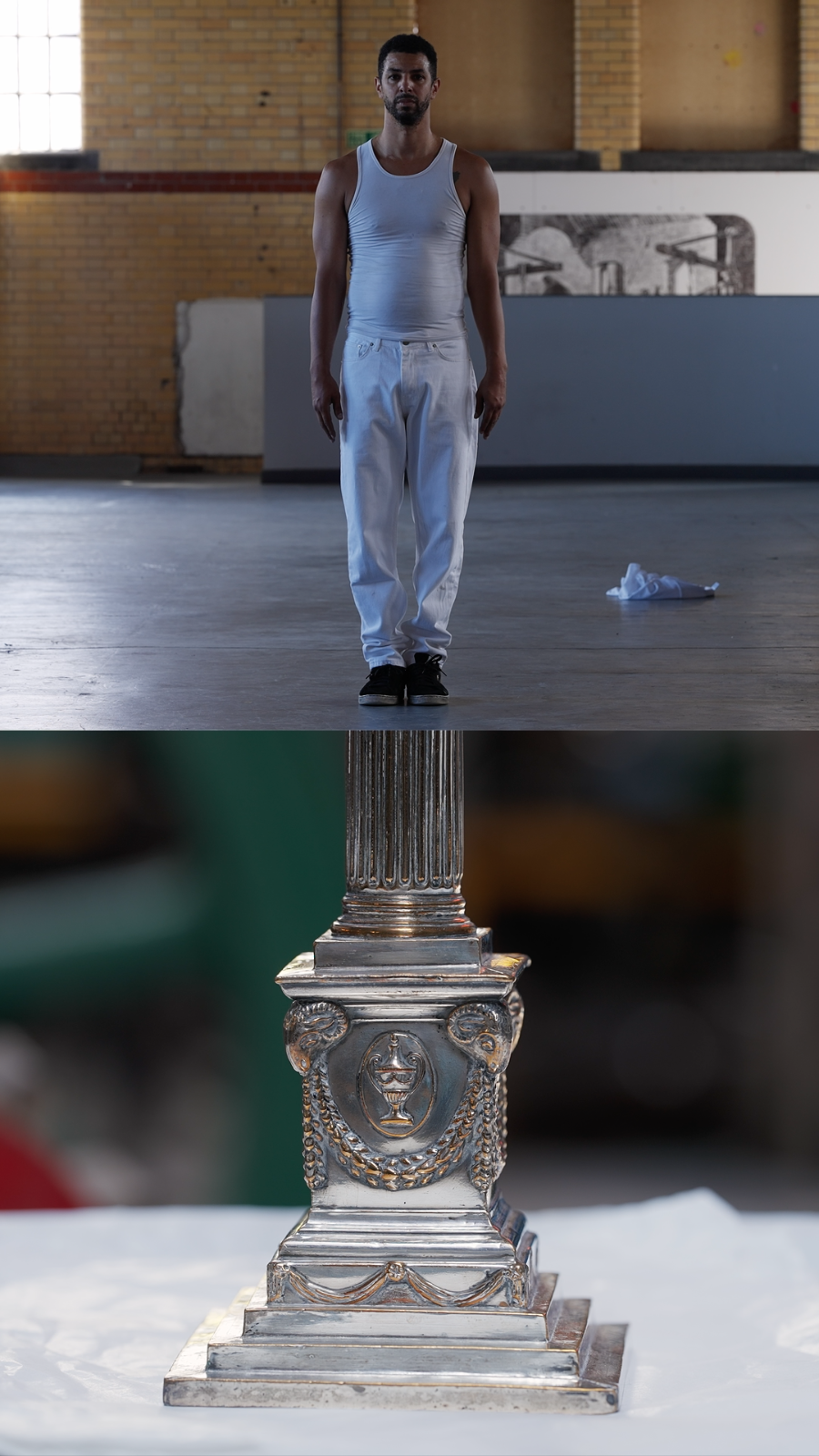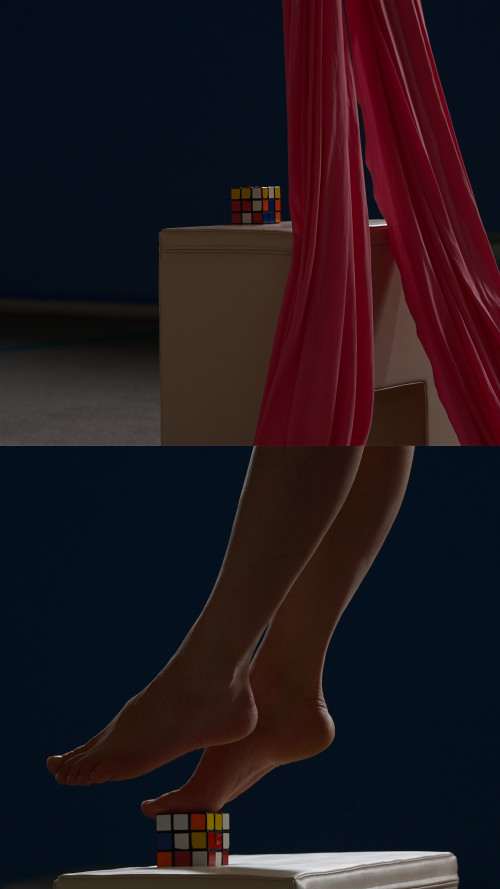‘Monumentalise’ Film Still, No.1 (2023), featuring Nathan Geering, Emma Paragreen at Kelham Island Museum, part of Sheffield Museums Trust. Production LUMO FILM.
Yuen Fong Ling is an artist curator based at Bloc Studios Sheffield, Fine Art Senior Lecturer and Post Graduate Research Tutor for Art and Design at Sheffield Hallam University. Graduated from MFA Glasgow School of Art (2005–7), and completed his PhD by Practice, ‘A Body of Relations: Reconfiguring the Life Class’ at University of Lincoln 2016. Recently, Ling has received professional development from ‘Making Ways’ Sheffield, ‘Platform Residency’ at Site Gallery, with Freelands Artists Programme. Recent projects include ‘Towards Memorial’ (2018–), and ‘The Human Memorial’ (2020–) including exhibitions at Persistence Works, Sheffield, Freelands Foundation, London, Bury Art Museum, and commissions from SAFEDI Project (MMU, Axis, Social Art Network), and 20/20 Project from Decolonising Arts Institute, UAL.
Ling has a performance and participatory based art practice that explores his biographical connections with permitted histories, people, places, and objects. Recent projects devised alternative forms of public monument and memorial making. This research has contributed to Commissioner evidence for Sheffield’s Race Equality Commission and Sheffield City Council’s Cultural Holdings Group to decolonising street names, statues and monuments. Ling was also part of the ‘Artist Working Group’ for the Centre for Contemporary Chinese Art’s (CFCCA) strategic revisioning, and now contributes to the ’ESEA Artists’ Futures’ national town hall event, and report to develop policy for East and South-East Asian artists in the UK.
Ling’s practice considers how race, gender, class, and sexuality (as a British born Chinese gay man from Salford) align with other historical personages to bridge the conjunctive gap between histories, stories, and places. Recently, he explored the making, gifting, and wearing of sandals once designed and handmade by gay socialist activist Edward Carpenter (1844–1929). Titled ‘Towards Memorial’, the Carpenter sandals became the protagonist in generating discussion, interviews, visual strategies that developed artworks, artefacts, exhibition design, and a series of films that drew the narrative together, to consider the sandals when gifted and worn, as an alternative form of public memorial.
Since COVID-19, the ‘Black Lives Matter’ and ‘Rhodes Must Fall’ movements have intensified, through protests and demonstrations by activists, wanting the removal of public statues relating to Britain’s colonial past. Ling began to align with this work critically, having developed research in alternative forms and methods for memorial making emphasising collaboration, co-design, and community participation. Simply driven by wanting to wrestle the conversation away from the ‘culture wars’ debate, party politics, and actively engage artists from ethnically diverse backgrounds into the discussion.
As a result, the project ‘The Human Memorial’ is part performance, part public engagement, part protest, prompted by the proposition of a mobile plinth and when, where it goes, and who it encounters. The film ‘The Empty Plinth‘ follows this process with a group of performers who respond through re-enactment, recreation, and play, and create alternative propositions for monuments and memorials, in sites linked to colonial street naming, across Sheffield. The 20/20 Project Artist Commission continues this work in the permanent collections at Sheffield Museums Trusts, pairing selected objects with performers, and sites, considering the scale and proximity of bodies of colour, in the public and private spaces of the city’s cultural heritage institutions.

Partner Reflection
Sheffield Museums
Sian Brown, Head of Collections
2024
The 20/20 project was timely, relevant and helpful to Sheffield Museums. It enabled us to have forward-thinking conversations across the team and to engage in a meaningful way with the artist Yuen Fong Ling. Yuen’s talent, commitment and generosity have had a profound influence on the success of the project and will have a much longer-term impact on both the collection and our organisational thinking and culture.
The 20/20 project offered a unique opportunity for us to work closely with an artist to explore Sheffield’s collections in a new way, to challenge preconceptions and make changes to our working practices. Yuen made a compelling case for wanting to engage with the city’s collections, and his passion and insight made him the perfect choice. Armed with knowledge of the city and desire to explore the collections in depth, we were keen to facilitate this process with Yuen, being led by his interests and helping us to look afresh.
Yuen started with a series of conversations with each of the collections curators, encompassing Archaeology, Natural Science, Industry & Metalwork, Social History, Visual Art and the Ruskin Collection. Through this organic process, he and the team explored the history of individual objects interrogating their ‘complicated inheritance’ and asking questions about their journey and the roles associated: maker, user, owner, collector, looter, donor. Uncomfortable histories were revealed during these dialogues, exposing the unequal power dynamics which underpinned the formation of both Sheffield collections and the city’s museums. Yuen encouraged us to explore the complexities of caring for a collection with origins that are contentious at best and, in some cases, imbued with the legacy of colonial violence.
The 20/20 project gave the Sheffield Museums team time and space to consider the objects we care for in different ways, challenging the traditional notion of the curator as keeper of a collection. Yuen brought new ideas and a fresh lens through which to explore these artefacts, inviting performers (including an aerial performer, actor, somatic movement performer, hip hop dancer and fire performer) to respond and interact with the objects physically, intellectually and emotionally. The resulting series of films, Monumentalise (2023), captured these multi-faceted exchanges, reflecting both the joy and the tension of these moments.
The project has supported and helped to develop Sheffield Museums’ work around decolonisation, challenging us to ask difficult questions and encouraging us to see and use the collections in different ways. Our perspectives shifted as the project developed and we considered how our roles could simultaneously care for the collections while acknowledging the unbalanced power dynamic and the need to rebalance this through relinquishing curatorial control so new lives for the objects could flourish. The project underlined the imperative of placing collaboration at the heart of our practice, with the Doing the Work sessions providing a springboard for thinking and discussion around collections development which will impact a review of Sheffield’s Collections Development Policy.
Throughout his residency at Sheffield Museums, Yuen engaged with staff from across the organisation, including the Learning, Collections, Exhibitions and Visitor Experience teams. His thoughtful questions, commentary and artwork have provided a generous and supportive framework to consider the role of the collections – past, present and future – but we know that there is much more work to do. We are in the early stages of this journey and are looking forward to continuing to work with artists as part of how we can interrogate the collections and the associated histories and stories further, finding ways to bring more people into the conversation.
